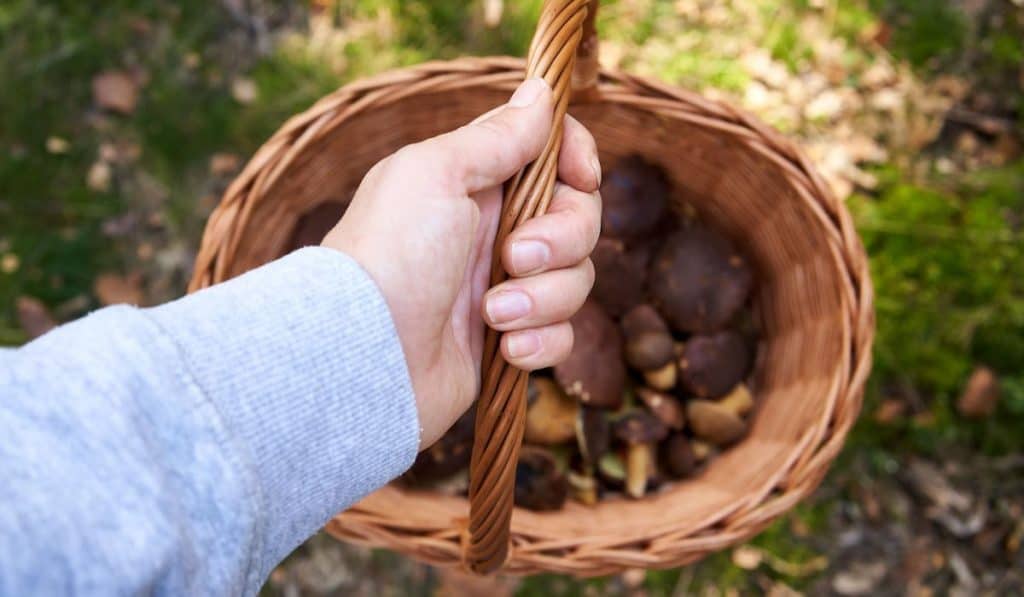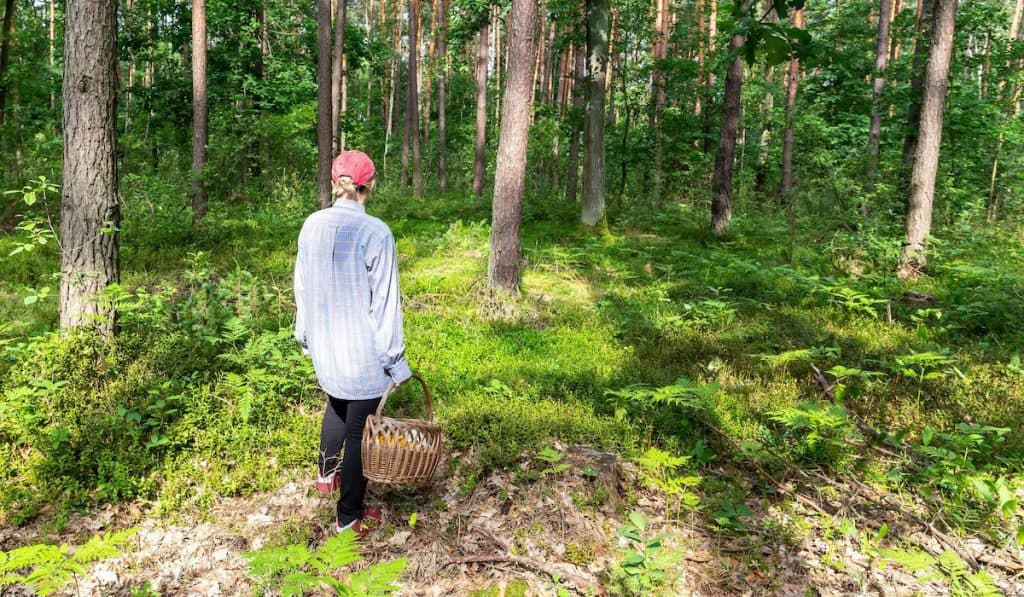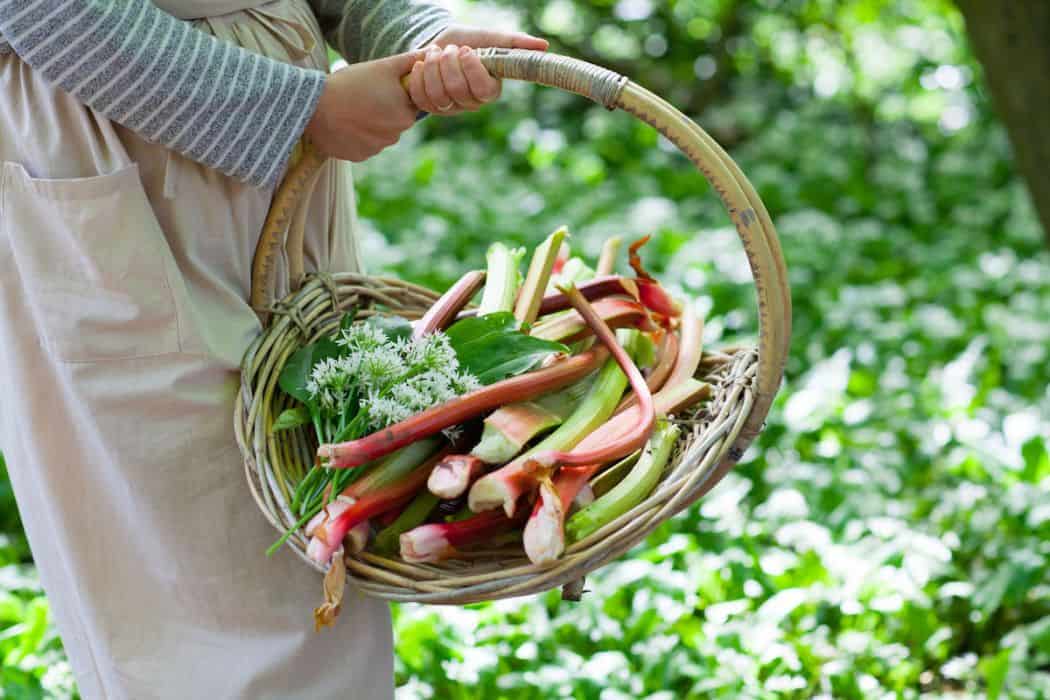There are foraging classes everywhere, and some of the best are in the UK. Learn how to forage in person, with a guided nature walk, or opt to take online foraging classes at home.
Soon, you’ll know what’s edible, what’s not, what’s endangered, and other information that’s key to becoming a great forager.
What is Foraging?
Foraging is the act of gathering wild food from the great outdoors or even your backyard. You can discover a variety of edible foods if you know where to look, and what to look for.
What sort of food? Woods and meadows are full of edible mushrooms, roots, greens, flowers, berries… you can even eat some tree leaves – or, better yet, tree bark.
Of course, there are equally as many (if not more) toxic plants that you’re likely to stumble upon. Some poisonous plants, aptly called ‘look-alikes’ even resemble edible plants.
To forage, you’ll need to know what you’re doing, or it can be fraught with risk. That’s what foraging classes are for.
Learn more about foraging here in our complete guide to foraging as a hobby

Are There Foraging Classes You Can Take in the UK?
In-Person Foraging Classes
In-person foraging classes are in many ways ideal. First off, you’ll be face to face with an instructor. This means that you can ask questions and quickly receive the answer. Second, you’ll be able to observe, and likely take part in, some hands-on foraging out in nature.
Your instructor can show you exactly where certain edible plants grow, and let you observe some toxic ones for yourself.
- Totally Wild UK has in-person foraging courses, where you can spend a day with a friendly and personable instructor gathering, and then make your own wild harvest meal. The average price of one of their day-long classes per person is £30.00.
- Wild Food UK offers a vast variety of in-person foraging courses, with different locations, like forests, meadows, or sea-side, to choose from. These are typically group-oriented classes, and many foraging walks include specially foraged and prepared refreshments, like Hogweed and Wild Garlic Soup or Elderflower Champagne. What more can you ask? The price of a daily class with Wild Food UK is £50-£60.
- Eat the Weeds UK features seaside courses and foraging edible seaweed, as well as classic foraging in a meadow or forest. In these classes, you can follow Robin, a professional forager, through the countryside and woodlands of Devon, Kent, Dorset, London, or Sussex. In these classes, you will be taught not just how to identify edible and poisonous plants, but also how to make them into dishes, what have been used in medicine, and even some interesting folklore about the topic. For a few-hour long walk with robin, the cost is £65.
- Foraging Course Company UK offers classic foraging classes all throughout the UK. The price of an average class with Foraging Course Company UK is £65.
Online Foraging Classes

If you can’t take foraging classes in person, or would prefer not to, online foraging classes are a fantastic alternative. While it’s hard to beat real-life experience, these online courses are full of helpful pictures, illustrations, and guides, and have all of the information you need to get started foraging.
As a bonus, you’ll be able to do it while sitting comfortably at home. So, what are some online foraging classes in the UK?
- Foraging Course Co. UK offers live webinars that you can join in. There are webinars featuring edible mushrooms, edible ornamental plants, etc. These are 90 minutes long each, and just £15 per viewer (device).
- Chestnut Herbs (School of Herbal Medicine) offers online classes that include not just introductory info, but full-length courses on plant identification, medicine making, seasonal foraging, and more. The price is $99 a month, or you can purchase the full courses for $1000-$1,200.
These are just a couple of the online foraging classes available to those living in the UK.
What Will You Learn About in a Foraging Class?
Edible Foods that You Can Forage
The primary focus of any foraging class will be on edible foods that you can forage yourself. This will include berries, greens, nuts, roots, tree-fruits, mushrooms, and more. You will learn about delicious edible foods for day-to-day, and ones you’d only be grateful for in cases of survival.
Toxic Plants to Avoid
There are more toxic plants out there than edible ones, by far. Learning how to identify them is of nearly equal importance.
This goes doubly once you realize how many treacherous ‘look-alikes,’ there are (the Moonseed fruits, for example, which grow on a vine and look like nothing so much as grapes in a cluster. Unlike grapes, they are quite poisonous, however).
You will learn how to differentiate between look-alikes from details like the shape of the leaves, the color of the flowers, the fragrance, and other subtly tell-tell signs to look for.
This will not only potentially spare your stomach some trouble, but it can also be a literal lifesaver!
Where to Forage

In order to forage efficiently, you’ll need to know where to look. For example, certain mushrooms prefer to grow off of trees, and certain greens grow only alongside a riverbank. By focusing on promising spots, you can gather much more effectively and efficiently.
Your location on the globe will also have a huge effect on what foraging is available. You will likely be taught this as well. For example, some places, like the Pacific Coast in the US, have green, bountiful forests all year.
Others, like the Mid-West, only have certain foods available at certain times of the year. Either way nearly everywhere has some edible foraged goods to offer (even if it’s just Prickly Cactus).
Fortunately, one of the best places for foraging worldwide is the UK. You just need to know what to look for and where to look!
When to Forage
As touched on above, knowing when to forage goes part and parcel with knowing where. After all, in the UK, dandelions will only fill the meadows in the balmier months of spring and summer.
Berries will not ripen until the harvest, near the end of the year. Rosehips follow roses, and never come before. Some mushrooms can be found from spring onwards, but most don’t show up until autumn.
Tree leaves can be eaten, yet are only savory when they are just uncurling and brand-new. Foraging classes will provide you with useful guidelines like these to follow.
How To Forage Respectfully
Any forager worth their salt should know how to forage respectfully. When you’re out there foraging, it’s hard to overlook how much nature truly does for us and how much it has to offer.
Preserving nature is the only way it will remain intact for us to enjoy. Learn when it’s okay to go off-trail and when it’s not and how much it’s okay to harvest at a time and in one place. If you feel so inclined, pick up any trash or litter, as a way to give a bit back.
Foraged Foods that You Can Sell
Did you know that some foraged foods are actually rather valuable? It’s true. In fact, some of the most valuable mushrooms, Oysters and Chicken of the Woods, grow here in the UK.
These typically go for as much as $20-$30 a pound when sold to a restaurant or store, or at a local’s farmer’s market. Elderflowers, when sold to restaurants and breweries, can also be a potential money-maker.
Popular Dishes Made With Foraged Foods
Many in-person foraging instructors will share some of their favorite things to make, like jams, sauces, or stir-fries. Online courses will also often share some recipes to get you started. Foraged foods can be turned into a variety of healthy, uniquely tasty dishes, snacks, and desserts. This includes smoothies, stir-fries, bread, salad, pasta… you name it.
Final Thoughts
Many foraging classes refer to ‘nature’s larder,’ a food source that’s available to us if only we know how to use it. Humans have been foraging since the earliest days of humanity for survival.
These days, foraged foods can also be used to create unique, delicious dishes that you harvested yourself. To learn how, simply take a look at some of the many foraging classes on offer!





